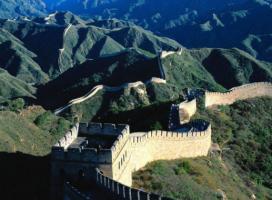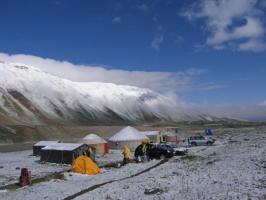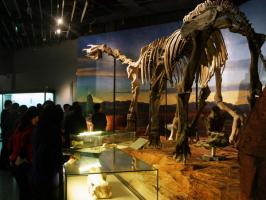Join-in Group Silk Road China Tours
About Us | Contact us | Tourist Map | Hotels | Feedback
Silk Road Attractions
Overhanging Great Wall
Lying in 7 km northwest of Jiayuguan, Overhanging Great Wall on the Cliff Great Wall highlights Jiayuguan attractions, which built in Ming dynasty in 1539. It was originally 1500 m but now only remains 750 m long.
The First Beacon Tower of the Great Wall
The First Beacon Tower of Jiayuguan Pass Great Wall, built during the Ming Dynasty (1368-1644), once passed the westmost border enemy situation and defense info to other parts of the country.
Wei-Jin Art Gallery
Situated in the desert 20 km northeast of Jiayuguan city, Wei-Jin Art Gallery is not really an art gallery but ancient tombs with wall paintings. There are more than 1400 tombs, which could date back 220-419 AD during Wei and Jin periods.
Id Kah Mosque
'Id Kah' means 'a place of praying and celebrating in festivals'. The Id Kah Mosque is located on the central square in Kashgar City, Xinjiang Uigur Autonomous Region. As the biggest mosque in China, it is a group of old Islamic constructions with strong ethnic style and religious features.
The Karakol Lake
The Karakul Lake is a paradise of bonfire night parties for boy and girl khalkhas with tourists. The party is full of songs and dances, as well as good smell of roast lamb skewers.
Gaotai Ancient Homes
In the old city district of Kashgar, Gaotai Ancient Homes is the most typical Uyghur dwelling house with a unique sight of heavy ethnic culture.
Pamir Mountains
The Great Silk Road crossed a number of Pamir Mountain ranges. Historically, the Pamir Mountains were considered a strategic trade route between Kashgar and Kokand on the Northern Silk Road.
Glacier No.1 of Tianshan Mountains
As the Headwaters of Urumqi River, the melting Tianshan Mountains No.1 Glacier sits in northwest China's Xinjiang Uygur Autonomous Region. It is the closest glacier to an urban community in the world.
Dabancheng Town
Urumqi Dabancheng Town District well known for a folk song called Dabancheng Girls and large-scale Wind Power Station views.
Turpan Museum
Turpan Museum is a museum in Turpan, Xinjiang, China. It has items from the Tang dynasty excavated from the Astana Graves which are located outside the town. Items include ancient silks, clothes and preserved corpses.

.jpg)
.jpg)



.jpg)




